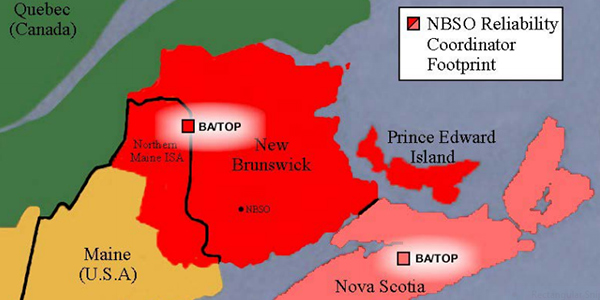The Northern Maine Independent System Administrator (NMISA) is asking New England transmission owners to eliminate through-and-out (TOUT) transmission charges for transactions between it and ISO-NE, similar to the reciprocal discount currently used by the RTO and NYISO.
NMISA CEO Ken Belcher and consultant Steve Garwood of PowerGrid Strategies outlined the proposal to the New England Power Pool Transmission Committee on Tuesday, saying it would eliminate pancaked transmission charges between the two regions, “consistent with FERC’s longstanding policy of eliminating seams issues where possible.”
NMISA, which serves a peak load of about 138 MW in Aroostook, Washington and Penobscot counties, is not directly interconnected with the rest of New England. Its two regions — Versant Power’s Maine Public District (MPD) in the north and the Eastern Maine Electric Cooperative in the south — connect to ISO-NE through the transmission facilities of New Brunswick’s NB Power. (Versant Power was formerly known as Emera Maine.)
Officials said the change would result in a “de minimis” impact on transmission rates for both regions while improving market efficiency and liquidity and increasing generation competition by reducing the costs for Northern Maine to access ISO-NE generation and for the RTO to use the region’s wind resources.
Had the proposal been in effect during 2019, it would have increased the June 1, 2020, regional network service rate by 4 cents/kW-year (0.03%), NMISA said, while MPD would see a 1.3% increase.
Northern Maine currently purchases about 70,000 MWh annually from ISO-NE, producing $67,000 in transmission revenue not subject to the discount. By reducing the seams costs, that could rise to 659,000 MWh, producing non-discounted charges of $633,000, NMISA said.
Increasing south-to-north transactions also would reduce congestion at the Orrington-South interface, potentially reducing curtailments of Northern Maine’s wind power exports to the RTO, the ISA said.
Northern Maine’s renewable exports are currently worth $2.5 million in renewable energy credits. That could increase by $750,000 through scheduling optimization, NMISA said. “Also, there is potential for further development of renewables up to 100 MW in Northern Maine for delivery to New England based on unused existing transmission capacity. Exporting the energy from these new resources to ISO-NE is unlikely to occur absent implementation of the proposed discount,” it said.
In its first presentation on the proposal at the joint Transmission/Reliability committees meeting in August, NMISA said MPD would have lost $164,546 in TOUT revenue had the charge been eliminated in 2019. In response to a question, it acknowledged that the revenue would have been $874,546 had MPD not already been discounting its export point-to-point rate. “However, absent continuation of the discount, it is unlikely that the same level of transactions would occur as occurred during 2019,” NMISA said.
Garwood said Northern Maine will ask ISO-NE’s Participating Transmission Owners Administrative Committee (PTO AC) at its Sept. 22 meeting to issue a notice of intent to eliminate the TOUT.
ISO-NE Proposes Tariff Revision on Transmission Charge Exemption for Storage
ISO-NE shared proposed Tariff revisions it intends to include in its third compliance filing on FERC Order 841 after the commission last month said the RTO had failed to demonstrate that a storage resource that is self-scheduled to charge at a fixed megawatt quantity is providing a service that warrants exempting it from transmission charges. (See FERC OKs Most of ISO-NE 2nd Storage Compliance.)
Jennifer Wolfson, an attorney for ISO-NE, presented the revisions on behalf of the RTO and PTO AC. Addressing FERC’s concern with self-schedules, she said that “a charging self-scheduled” storage dispatchable asset-related demand (DARD) provides similar services as “a charging pool-scheduled” storage DARD.
ISO-NE and the PTO-AC contend that all charging megawatts of a self-scheduled storage DARD supply voltage support and reactive control. “A self-scheduled resource is required to follow ISO dispatch instructions, without delay, to consume at the requested megawatt level; therefore, when it charges it provides real-time balancing of supply and demand and operating reserve,” they say. “A charging self-scheduled storage DARD, in contrast to other load, helps address reliability concerns given that the ISO can dispatch the load off if needed to address a contingency.”
The Tariff revisions state that storage will be exempt from transmission charges only if its charging load does not include station service load or any other load and “is providing one or more of the following services: reactive power voltage support, operating reserves, regulation and frequency response, balancing energy supply and demand, or addressing a reliability concern.”
The Transmission Committee will vote on the proposed Tariff revisions on Oct. 27, with a Participants Committee vote expected Dec. 3.
Last week, RTO officials outlined their plans for responding to two other directives from FERC’s Aug. 4 order. (See “Order 841 Compliance Update,” NEPOOL Markets Committee Briefs: Sept. 8, 2020.)
The compliance filing is due Dec. 7.





